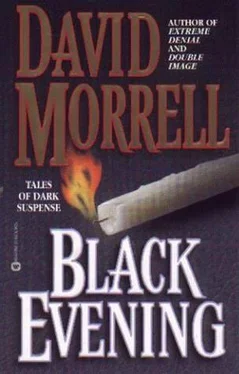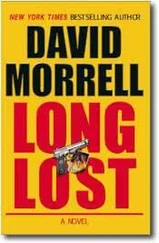David Morrell - Black Evening
Здесь есть возможность читать онлайн «David Morrell - Black Evening» весь текст электронной книги совершенно бесплатно (целиком полную версию без сокращений). В некоторых случаях можно слушать аудио, скачать через торрент в формате fb2 и присутствует краткое содержание. Жанр: Ужасы и Мистика, на английском языке. Описание произведения, (предисловие) а так же отзывы посетителей доступны на портале библиотеки ЛибКат.
- Название:Black Evening
- Автор:
- Жанр:
- Год:неизвестен
- ISBN:нет данных
- Рейтинг книги:4 / 5. Голосов: 1
-
Избранное:Добавить в избранное
- Отзывы:
-
Ваша оценка:
- 80
- 1
- 2
- 3
- 4
- 5
Black Evening: краткое содержание, описание и аннотация
Предлагаем к чтению аннотацию, описание, краткое содержание или предисловие (зависит от того, что написал сам автор книги «Black Evening»). Если вы не нашли необходимую информацию о книге — напишите в комментариях, мы постараемся отыскать её.
Black Evening — читать онлайн бесплатно полную книгу (весь текст) целиком
Ниже представлен текст книги, разбитый по страницам. Система сохранения места последней прочитанной страницы, позволяет с удобством читать онлайн бесплатно книгу «Black Evening», без необходимости каждый раз заново искать на чём Вы остановились. Поставьте закладку, и сможете в любой момент перейти на страницу, на которой закончили чтение.
Интервал:
Закладка:

David Morrell
Black Evening

Copyright © 1999 by David Morrell
To Philip Klass and William Tenn
once again
For anything, the most banal even, to become an adventure, you must (and this is enough) begin to recount it. A man is always a teller of tales, he lives surrounded by his stories and the stories of others, he sees everything that happens to him through them, and he tries to live his own life as if he were telling a story.
But he has to choose: live or tell.
JEAN-PAUL SARTRE
La Nausée
Foreword
Rereading the stories in this collection, I wasn't prepared for the flood of powerful memories that they evoked. I suddenly recalled the circumstances under which each was written – where I was living, what I was feeling, why I was motivated to compose each tale. Those emotion-filled memories extend back more than thirty years, and yet it seems only last week that I was a graduate student in American literature at the Pennsylvania State University.
The year was 1967. I was 24, about to complete my Master's degree, looking ahead to course work for my Ph.D., but unable to ignore a compulsion that had gripped me since high school: to be a fiction writer. Penn State 's English Department had recently hired a noted science fiction writer, Philip Klass (whose pen name is William Tenn), to teach composition. He was the first professional writer I had met, and with the innocent brazenness of youth, I asked him if he would give me personal instruction. He answered politely that his schedule was already full to bursting and if I wanted to be his student, why not sign on for a course. I explained that I felt I would benefit more from one-on-one discussions. He responded that certainly every student would benefit from that approach but unfortunately there wasn't time. Sensing that I would persist, he told me that if I gave him a story a week, he might reconsider. For how many weeks? I asked. For as long as necessary, he replied.
Obviously Klass was trying to discourage me. A story a week, in addition to my considerable course load, was burdensome. The odds were, he clearly thought, that I would soon get tired and give up. After all, even if I did deliver a story a week (and for heaven knew how long), there still wasn't any guarantee that he would teach me. He had only promised to reconsider my request.
But my mother hadn't raised a quitter, and I kept at it.
Finally, after I had submitted a story a week for six weeks, I was heartened to receive a note in which Klass asked me to come to his office. This is it, I thought. My big chance. He'll tell me he liked my stories, and he'll arrange to have them published. To the contrary, he told me that the stories weren't satisfactory and would I please stop bothering him.
"Your subject matter isn't special enough," Klass said. "All successful writers have a distinctive compelling approach, a particular world view that makes them unique. Look inside yourself. Find out who you are, which usually means find out what you're most afraid of. That will be your subject for your life, or until your fear changes. But I don't mean fear of heights or water or fire," he continued. "Those are the superficial symptoms of much deeper fears. Your true fear is like a ferret darting within the tunnels of your psyche, desperate not to be discovered."
I did my best to nod wisely. "I think I understand."
"Good."
But I really didn't understand. Confused, I went off and did exactly what Klass had warned me not to do – I wrote stories about fear of heights and water and fire. To my credit, this new batch of stories didn't fool me. I knew that they lacked something, that they didn't have whatever spark of inspiration separates ordinary stories from memorable ones. Nonetheless I persisted. And persisted.
And suddenly felt something give way in me. My willpower had finally snapped. After all, writing is an act of faith. And if you lose faith in yourself, if insecurity makes you realize just how unnatural it is to sit scribbling all alone, to sacrifice time with your wife and daughter, to give up your few moments of leisure, to gamble against the unlikely odds that you will be one of the very few (only about 200) prose fiction writers in the United States who are able to support themselves by writing… Well, you run out of hope.
I found myself wishing I was somewhere else. Years before, there had been an iron mine outside State College where Perm State is located. Known as The Barrens, it was a large open pit that had been abandoned after it turned into a lake when a dynamite blast released an underground stream. On occasion, I used to go there – to hike and appreciate the woods around the former mine. Discouraged with my writing efforts, I decided to go there yet again. It was a blazing August afternoon. The forest was dense and humid, drooping in the summer heat, closing in on me, and as I walked along the narrow trail, wary of snakes that might be in the underbrush, I heard a sound behind me – the snap of a branch. A squirrel leaping from tree to tree, I thought. I kept going, wiping the sweat from my brow, when I heard another branch snap and the crunch of what sounded like a footstep on dead leaves.
Someone else was in the forest, I realized. Someone else was out for a hike, looking for relaxation. So I kept following the narrow trail, and the next time I heard a branch snap and a footstep crunch on dead leaves, I felt a cold spot between my shoulder blades. The primal reaction seized me without warning. It was inexplicable. I had an abrupt premonition that whoever was in the forest meant to harm me. This irrational apprehension grew in strength as I heard yet another snap, another crunch, coming closer. No matter how hard I strained to peer behind me, I saw no movement in the forest.
I walked faster along the trail. To my relief, the sounds behind me stopped. I breathed easier, only to stop breathing altogether as I heard the approaching snap and crunch begin again, but this time in front of me. I froze as if paralyzed. Adrenaline gave me motion. I backed up. And froze again as I heard someone behind me. I turned in a circle, on guard against every flank.
And blinked in surprise when I found a desk and a typewriter before me. The intense, vivid, visceral experience had been a daydream, or a better description would be a daynightmare. I had so disappeared into my psyche that I had lost touch with my surroundings. Imagination had felt more real than reality. Nothing like this had ever happened to me before. It made me remember what Klass had said: "Your true fear is like a ferret darting within the tunnels of your psyche, desperate not to be discovered."
But sometimes it might be possible to get close to it, I realized. The daydream had certainly scared me. What was it about? What was going to happen next? The urge to know the outcome made me realize how much my earlier stories had lacked forward motion. Suspense. A fresh vision. I didn't know any fictional situation like the one I had just imagined. James Dickey's Deliverance would be published three years later. That 1970 novel about terror on a backwoods canoe trip amazed readers with its new approach to fear. But in 1967, before Deliverance , I felt on my own. By surrendering to my problem of how to be a fiction writer, I had in Zen fashion allowed my problem to solve itself.
Читать дальшеИнтервал:
Закладка:
Похожие книги на «Black Evening»
Представляем Вашему вниманию похожие книги на «Black Evening» списком для выбора. Мы отобрали схожую по названию и смыслу литературу в надежде предоставить читателям больше вариантов отыскать новые, интересные, ещё непрочитанные произведения.
Обсуждение, отзывы о книге «Black Evening» и просто собственные мнения читателей. Оставьте ваши комментарии, напишите, что Вы думаете о произведении, его смысле или главных героях. Укажите что конкретно понравилось, а что нет, и почему Вы так считаете.












